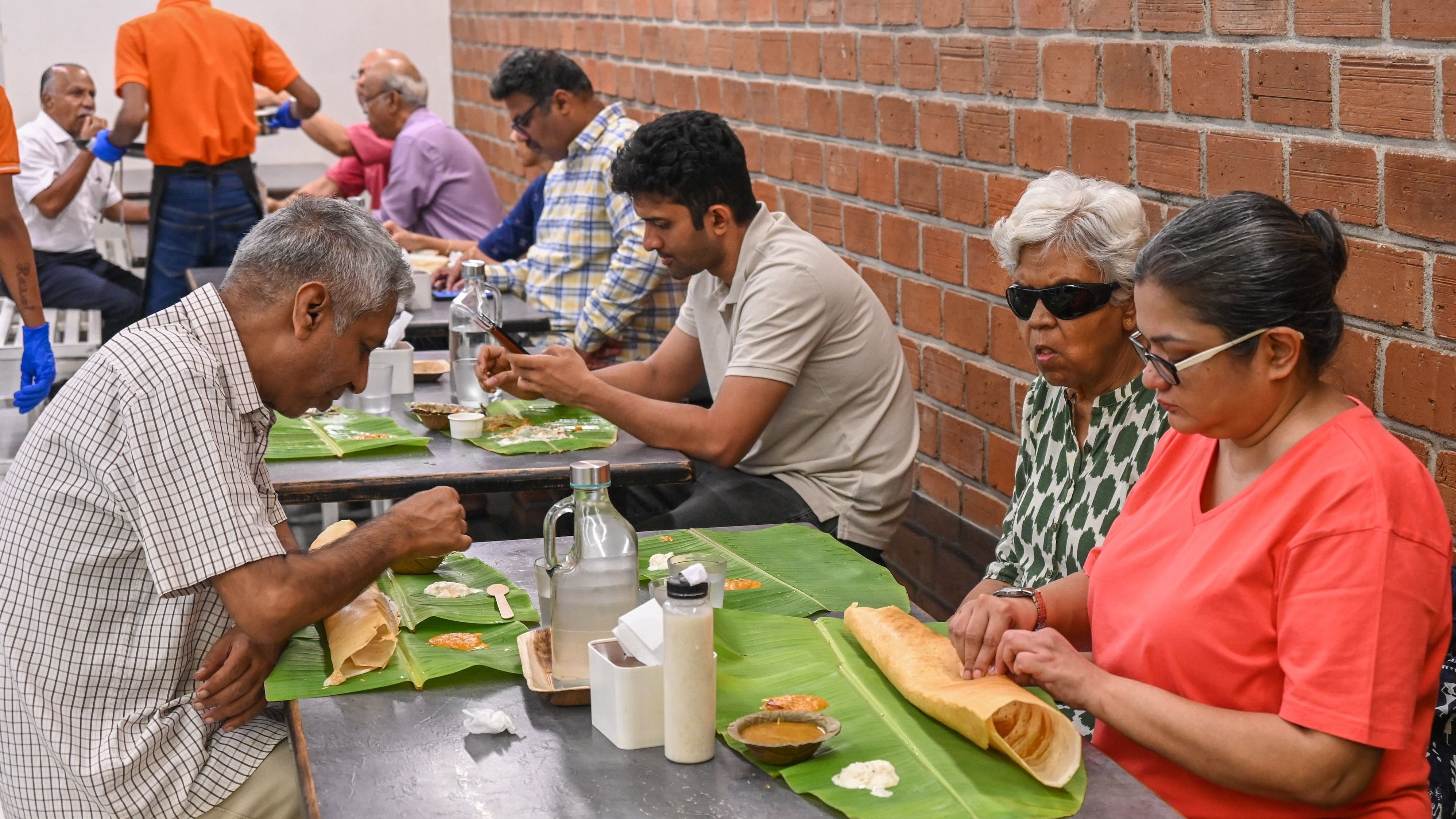
Some restaurants have served food on banana leaves for a decade, conserving water, soap, and labour, while others, hit by water shortages and rising tanker costs, have switched to disposable cutlery.
DH Photo
With rising temperatures and little rainfall amid the water crisis, darshinis and mid-level restaurants in Bengaluru are being forced to implement multiple measures to conserve water. The severe shortage has driven them to adopt a variety of unique solutions, although these measures have led to new concerns, particularly in waste management.
Eateries rely heavily on water for various activities, and the shortage has consequently increased production costs.
Speaking to DH, PC Rao, President, Bruhat Bangalore Hotels Association (BBHA),said, “Restaurants across Bengaluru primarily obtain water from two sources: the Bangalore Water Supply and Sewerage Board (BWSSB) and personal borewells. A few, lacking access to both, depend on private tankers.”
In recent months, as the BWSSB’s water supply has dwindled and several borewells have dried up, the dependency on water tankers has increased, causing their prices to skyrocket. “Although the situation has slightly improved, many are still compelled to pay between Rs 900 to Rs 1,200 for water tankers,” Rao added.
Arun Adiga from Vidyarthi Bhavan mentioned some of their conservation strategies: “Although we have our own borewell, we conserve water using our dishwasher. We also treat water through an RO plant and use it for all cleaning tasks.”
Other restaurants have found that installing mandatory aerators, as directed by the BWSSB about a month ago, has helped reduce water consumption. C N Bidappa, manager at K C Das Hall, Church Street, told DH, “Following the BWSSB orders around a month ago, we have installed aerators in our store and factory. Although priced at 80 Rs a piece, it proved costly, but it will help us save water in the long run.”
The BBHA has also recommended using awareness posters to reduce water usage by 20%.
Disposable cutlery
However, facing the dual challenges of severe water shortages and rising tanker prices, many eateries have decided to replace their washable cutlery with disposable options, reducing both labor and water used for washing. Suresh from Mane Holige in DVG Road, Gandhi Bazaar, explained to DH, “We use disposable plates since they are more economical than spending Rs 700 daily on 6,000 litres of water.”
While many have already made the switch, others like Krishnamurthy Aithal, proprietor of Dwarka Hotel, are considering it: “We’re still using steel plates and reusing them after washing. However, due to the lack of a borewell and the acute water crisis, we might have to consider switching to disposable plates soon.”
M Nagaraj, the owner of Sri Seshamahal Hotel, Church Street, explained that disposable cups could solve the water crisis and other logistical problems for darshini-type hotels. “Darshinis usually run on small spaces and disposable plates can not only prove to be cheaper than tankers but also make up for the lack of washing space and labour in their premises,” he said.
Similar views were echoed by Siri from Guru Kottureshwara Davanagere Benne Dose Hotel, who said they hadn’t faced any water shortage but preferred disposable plates due to labour shortage.
Challenges in waste management
However, experts claim that disposable cutleries can lead to more significant problems in waste management. Speaking to DH, on terms of anonymity, an expert working with solid waste management explained, “The major issues pertaining to waste collection in Bengaluru are not in the residential but in commercial areas. Due to the lack of clear directives from BBMP, several private players are competing for waste collection contracts in commercial areas, leading to a lot of mismanagement.”
They added that although the dry waste collection numbers have not gone up in recent months, they might rise later, or because of the mismanagement, the disposable plates might be going into mixed waste.
Similar issues were also flagged by a few eatery owners. Aithal, who has been contemplating the switch, said disposable plates have their own challenges. He said that although paper plates are cheap, they are not advisable for items like Chutney and Saagu, and he added that plates made of areca nut sheets cost more- around Rs 10 per plate. “Waste disposal is a major issue. We are already struggling with it, and the problems will be exacerbated if we start using disposable plates,” he added.
Amid the confusion, a few eateries have stuck to the traditional way and are serving food on banana leaves. Sanskrit Singh, co-founder of Filter Coffee, shared that they have been using banana leaves for the past decade.
“Although it is a little expensive, around Rs 2 to Rs 3 per piece, we save on water, soap and labour. This generates only wet waste, which we transport twice daily to the piggeries.” he said.